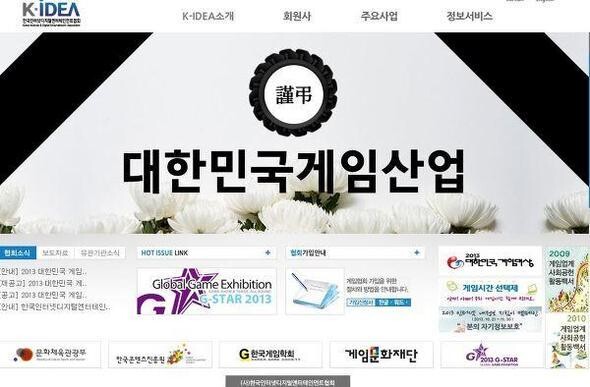hankyoreh
Links to other country sites 다른 나라 사이트 링크
S. Korean gaming companies driven overseas

By Lee Deok-kyu, Gameabout reporter
The sports community has been under fire for short-track speed skater Viktor Ahn’s (born Ahn Hyun-soo in South Korea) decision to take Russian citizenship. The argument is that Ahn, who won a gold medal at the Sochi Olympics, was driven to give up his South Korean citizenship by deep-rooted irrationalities in the domestic skating administration. But it’s a situation that is now reaching beyond the sports world.
South Korean online gaming companies, some of the biggest contributors to the country’s content exports, are facing a similar dilemma to Ahn’s as they contend with a poor development environment and intensifying game regulations.
First there was the shutdown system, which regulates late-night gaming by young people. Then, last year, a “gaming addiction bill” was introduced that would include gaming alongside alcohol and drugs as one of four major addictive vices to be regulated. The legislation has few parallels anywhere else in the world.
Blizzard Entertainment, a major player in South Korean gaming for the last 20 years, was skeptical, calling South Korea “a difficult place to run a gaming company.”
Perhaps the best-known example of a firm opting to go overseas is Nexon, which went public on NASDAQ Japan and moved its head offices from South Korea to Japan. Its South Korean services are handled by Nexon Korea, which is basically an affiliate, while the Japanese corporation in Tokyo oversees the group’s operations.
“We chose Japan because we wanted to do real business in a big and stable market,” said chairman Kim Jung-joo at a lecture in Daegu.
Many companies have been sold off to major foreign corporations. Gravity, which dominated the first generation of South Korean game exports with its “Ragnarok,” was sold to Japan’s GungHo Online Entertainment. China’s Shanda Games acquired the South Korean firms Actoz Soft and EyeDentity Games. Tencent, China’s biggest gaming company, has been investing some of its vast capital stores in buying other South Korean game companies. Those Chinese companies’ strategy has been to identify and acquire smaller companies that have been neglected back home.
In other cases, South Korean companies have used Chinese funding to develop games specifically for the Chinese market. NSE Entertainment, which is more or less unknown in South Korea, used Chinese support to develop the action game Sura Online. Its China release, which came before its South Korean debut, was a big hit.
“We started in China, but we’re looking forward to the day when there will be South Korean service too,” said the company’s president. Overseas firms that once acquired the rights to South Korean games for local servicing are now buying up the companies outright.
Great Britain, Germany, and other European companies are now making overtures as well. The German government recently promised lavish support to South Korean companies who relocate to Germany to develop games. Britain said it would offer tax breaks. In Britain’s case, gaming is seen as a major entertainment industry, with active efforts committed to company development.
“South Korean companies are facing tough regulations and a harsh environment,” said an employee at one game company on condition of anonymity. “The Viktor Ahn story is really resonating with us.”
Please direct questions or comments to [english@hani.co.kr]

Editorial・opinion
![[Column] Samsung’s ‘lost decade’ and Lee Jae-yong’s mismatched chopsticks [Column] Samsung’s ‘lost decade’ and Lee Jae-yong’s mismatched chopsticks](https://flexible.img.hani.co.kr/flexible/normal/500/300/imgdb/original/2024/0512/3017154788490114.jpg) [Column] Samsung’s ‘lost decade’ and Lee Jae-yong’s mismatched chopsticks
[Column] Samsung’s ‘lost decade’ and Lee Jae-yong’s mismatched chopsticks![[Correspondent’s column] The real reason the US is worried about Chinese ‘overcapacity’ [Correspondent’s column] The real reason the US is worried about Chinese ‘overcapacity’](https://flexible.img.hani.co.kr/flexible/normal/500/300/imgdb/original/2024/0510/5217153290112576.jpg) [Correspondent’s column] The real reason the US is worried about Chinese ‘overcapacity’
[Correspondent’s column] The real reason the US is worried about Chinese ‘overcapacity’- [Editorial] Yoon’s gesture at communication only highlights his reluctance to change
- [Editorial] Perilous stakes of Trump’s rhetoric around US troop pullout from Korea
- [Guest essay] Preventing Korean Peninsula from becoming front line of new cold war
- [Column] The state is back — but is it in business?
- [Column] Life on our Trisolaris
- [Editorial] Penalties for airing allegations against Korea’s first lady endanger free press
- [Editorial] Yoon must halt procurement of SM-3 interceptor missiles
- [Guest essay] Maybe Korea’s rapid population decline is an opportunity, not a crisis
Most viewed articles
- 1[Column] Samsung’s ‘lost decade’ and Lee Jae-yong’s mismatched chopsticks
- 2S.K.-Japan joint history project to be revived
- 3Yoon rejects calls for special counsel probes into Marine’s death, first lady in long-awaited presse
- 4Seoul’s plan to adopt SM-3 missiles is like wanting a sledgehammer to catch a fly
- 5With Naver’s inside director at Line gone, buyout negotiations appear to be well underway
- 6Korea poised to overtake Taiwan as world’s No. 2 chip producer by 2032
- 7S. Korean arrested and detained in Russia under espionage charges for first time in history, Moscow
- 8[Correspondent’s column] The real reason the US is worried about Chinese ‘overcapacity’
- 9[Korea travels] Korea’s best stargazing spots put the Milky Way almost in reach
- 10‘We must say no’: Seoul defense chief on Korean, USFK involvement in hypothetical Taiwan crisis